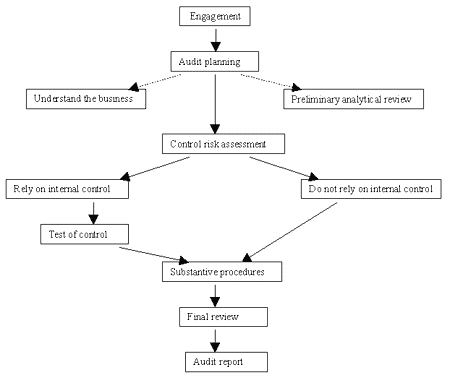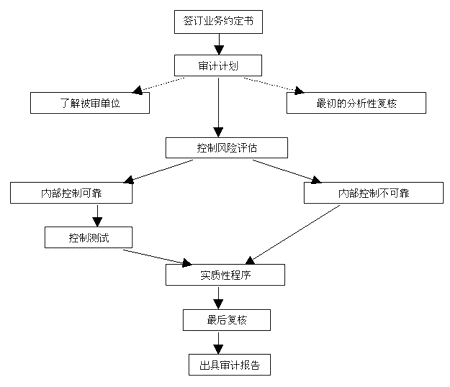针对2007年注会考试首次在《会计》、《审计》科目中加试英语题,财务英语老师Julia在最快的时间内整理了相关专业英语及对照中文翻译,以供考生参考。考生需要注意的是:
1.《会计》、《审计》是注会考试中较难的两门课程,考生历来反映考试时间紧迫,因此,加入附加题后,考生要更好的规划和安排考场时间,不能出现顾此失彼和慌乱的情况;
2.本次提供的资料旨在扫清考生在专业英语上的词汇障碍,不涉及基础英语能力的培养和具体审计、会计准则的讲解,因此,考生只有具备一定的英语水平,才可选择答附加题,并参考本中心提供的资料;
3.提醒广大考生不要因附加题的变革而产生心理落差或是其他不利情绪,具备英语基础的考生也不能出现松懈情绪或优势心理;
4.最后祝愿考生综合平衡、稳定发挥、顺利通过注会考试!
Auditing
1.Assurance engagements and external audit
Materiality, true and fair presentation, reasonable assurance
Appointment, removal and resignation of auditors
Types of opinion: unmodified opinion, modified opinion, adverse opinion, disclaimer of opinion
Professional ethics: independence, objectivity, integrity, professional competence, due care, confidentiality, professional behavior
Engagement letter
2.Planning and risk assessment
General principles
Plan and perform audits with an attitude of professional skepticism
Audit risks = inherent risk ×control risk ×detection risk
Risk-based approach
Understanding the entity and knowledge of the business
Assessing the risks of material misstatement and fraud
Materiality (level), tolerable error
Analytical procedures
Planning an audit
Audit documentation: working papers
The work of others
Rely on the work of experts
Rely on the work of internal audit
3.Internal control
The evaluation of internal control systems
Tests of control
Substantive procedures (time, nature, extent)
Transaction cycles: revenue, purchases, inventory, etc.
4.Audit evidence
Obtain sufficient, appropriate audit evidence
Assertions contained in the financial statements: completeness, occurrence, existence, measurement, presentation and disclosure, rights and obligations
The audit of specific items
Receivables: confirmation
Inventory: counting, cut-off, confirmation of inventory held by third parties
Payables: supplier statement reconciliation, confirmation
Bank and cash: bank confirmation
Auditing sampling
5.Review
Subsequent events
Going concern
Management representations
Audit finalization and the final review: unadjusted differences
6.Reporting
Appendix
Audit procedure

审计
1. 鉴证业务和外部审计
重要性,真实、公允反映,合理保证
注册会计师的聘用,解聘和辞职
审计意见类型:无保留意见,保留意见,否定意见,无法表示意见
职业道德:独立、客观和公正,专业胜任能力,应有的关注,保密性,职业行为
审计业务约定书
2.审计计划和风险评估
一般原则
计划和执行审计业务应保持应有的职业怀疑态度
审计风险=固有风险×控制风险×检查风险
风险导向型审计
了解被审单位
估计重大错报或舞弊的风险
重要性水平,可容忍误差
分析性复核程序
制定审计计划
审计记录:工作底稿
利用其他人的工作
利用专家工作
利用内部审计人员的工作
3.内部控制
内部控制系统评价
控制测试
实质性程序(时间,性质,范围)
Transaction cycles: revenue, purchases, inventory, etc.
4.审计证据
获取充分、适当的审计证据
财务报表所包含的认定:完整性,发生,存在,计价,表达和披露,权利和义务
具体项目的审计
应收账款:函证
存货:盘点,截止测试,对第三方持有存货进行函证
应付账款:供应商对帐,函证
货币资金:银行函证
审计抽样
5.复核
期后事项
持续经营
管理层声明
终结审计和最后复核:未调整差异
6.审计报告
附录:
审计流程
